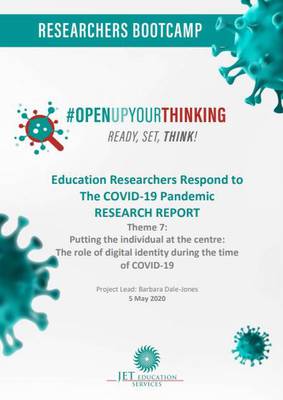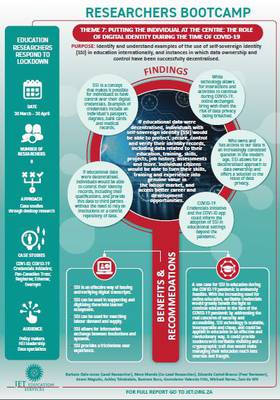Theme 7: Putting the individual at the centre: the role of digital identity during the time of COVID-19
Download the final report and infographic
|
|
|
BACKGROUND
Should individuals be given ownership of and control over their data using self-sovereign identity (SSI) management systems and interoperable data standards? What are the pros and cons for allowing individuals to own and control their data using SSI management systems during a national or global crisis?
Who owns our data is an increasingly contested question in the modern age - think of Facebook, Cambridge Analytica, Amazon and Google. In 2020, who should own our data? And, in the extraordinary and unprecedented global pandemic of COVID-19, with governments overtly controlling the rights and choices of individuals, the sovereignty of our data and our rights to it may be being increasingly eroded especially as governments battle to balance the individual rights to privacy and national security.
The question of what kind of technology we use to store our data has far-reaching implications for the question of who owns our data and who has control over it. New models of data storage are emerging, where data is stored in decentralized systems without a central point that can control access and use. Given the value of data, and the dangers of allowing centralised organisations and systems to control and monetise data, it may ultimately be desirable to allow citizens not only to have agency in respect of their own data, but also to control every aspect of their data and to have full ownership of it through distributed and decentralised networks such as the blockchain, which offers a solution to protect individual privacy.
If educational data were decentralised, individuals with portable, self-sovereign digital identities would be able to control their identity records, including data related to their education, training, skills, projects, job history, assessments and more, and provide this data for verification and transactions without the need to rely upon a central repository of data. In terms of education, individuals would be able to turn their skills, training and experience into genuine value in the labour market, and access better career and development opportunities.
But, giving individuals ownership of and control over their data is not without complexity or risk. It is possible and/or advisable to have a digital ecosystem that is open, standards-based, and decentralised?
OBJECTIVES OF THE RESEARCH
The purpose of this project is to identify and understand examples of the use of SSI in education internationally, and to identify ways in which the risks of decentralising data ownership and control have been understood and mitigated.
RESEARCH QUESTIONS
- Where is SSI being used in the education system both locally and abroad?
- What risks have been identified in these projects regarding individual ownership of data?
- How are these projects mitigating these risks?
METHOD
Desktop research about SSI at work in education.
The following are some examples that will be investigated:
- MIT & many other US universities started an initiative late last year: https://digitalcredentials.mit.edu/
- The EU is driving a framework for SSI forward, one of the major use-cases is digital diplomas: https://www.eesc.europa.eu/sites/default/files/files/1._panel_-_daniel_du_seuil.pdf
- Workday (HR SaaS offering) has launched a credential issuance platform for employees: https://blog.workday.com/en-us/2019/our-vision-to-digitize-credentials-in-the-new-world-of-work.html https://credentials.workday.com/docs/overview/
- World Wide Web inventor Tim Berners Lee’s new venture, inrupt: https://inrupt.com
- SSI's Problem with Data Ownership: https://hackernoon.com/ssis-problem-with-data-ownership-us2z34op and https://registree.rocks



